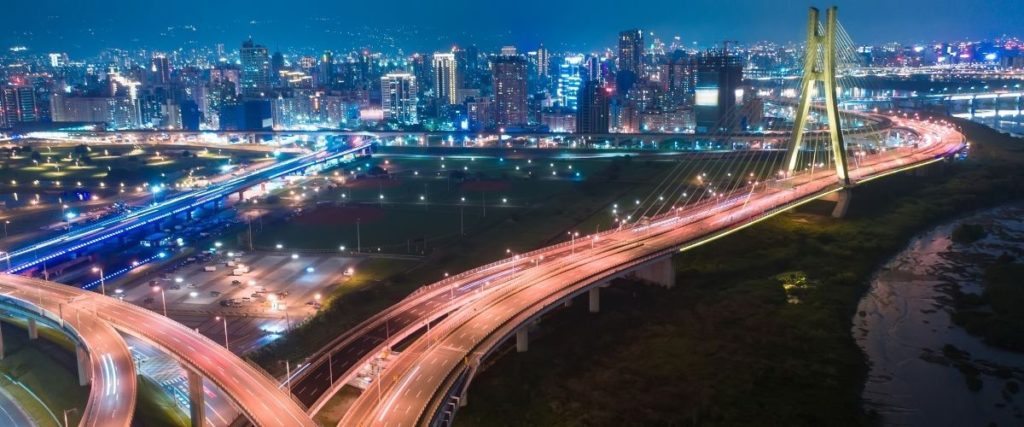Explore Taiwan’s Smart City project, and read more about how smart cities are reinventing the way we live.
In 2018, Taiwan’s Industrial Development Bureau (IDB) initiated a “Smart City Taiwan” project to create communities that are livable, business-facilitating, and innovation-fostering. Smart cities embed smart technology including artificial intelligence (AI), internet of things (Iot), and other services in order to make living more efficient and accessible for its residents. With every country integrating technology into their societies, 40% of market growth for smart city projects will mostly be from countries within the Asia Pacific region, including Singapore’s Forest Towns, Australia’s Smart Cities and Suburbs Program, and Hong Kong’s Smart City Blueprint. With Taiwan’s new project on the way, here are some ways Smart City Taiwan is changing the concept of the traditional city through the integration of smart applications and other technology.
Smart Transportation and Mobility
The transportation and technology industry has become one of the key focuses the government wants to achieve in the next five years. Over the course of the development process, the government is expected to invest US$200 million in creating smart transportation technology like smart traffic data analysis, smart parking meter systems, and smart ticketing systems using an app. This not only upgrades the transportation services, but will also minimise the time spent looking for a parking spot, eventually decreasing air pollution. The goal of this implementation is also to create new business opportunities and transform the transportation network’s digital infrastructure.

Smart Wearable Safety
In 2018, Taiwan was listed as a super-aged society with 20% of its population represented by those aged 65 and above. Around 4.3% of the country’s aged population suffers from dementia due to Alzheimer’s disease, and to prevent elderly citizens from getting lost or going missing, ONE-LiFE created the PingAmulet D+ card which is a positioning smart sensor card using IoT and Bluetooth technology. Once a user wears it and leaves their designated area, their caregivers will receive a message alert to show where they are moving to. The card also includes an SOS emergency button in case of an injury and also has a battery that can last up to a year without needing to be charged regularly.

Smart Healthcare
Taiwan’s HealthTech industry is advancing progressively, however, in rural areas of the country, some individuals are not able to access the same care as those living in urban areas. Around half of Taiwan’s rural areas lack ophthalmology clinics, leading Leosys to develop an AI-assisted ophthalmology patrol service which includes a portable eye examination kit. Utilising medical manpower from the Universal Eye Center, the company is able to better provide optometric services to improve mobility and convenience for those who are unable to seek eye care. Leosys’ innovation can also collect fundus photography images to establish a database to better diagnose and identify glaucoma, cataracts, and muscular diseases using AI.
Smart Agriculture
Because of the low birth rate and an increased aging population, the agriculture sector in Taiwan is expected to have a labor shortage. Smart agriculture and precision farming technology have become a prominent solution to address this issue, where production value is approximately US$18.6 billion. For more information on the Taiwanese AgriTech industry, read our guide to some of the startups innovating in this area.
Smart Energy
Currently, there are 304 million streetlights in the world, and each light can use up to 1000 watts. About 15 million tons of carbon dioxide are emitted annually to provide light for streets, which takes more than 600 million trees just to offset that amount of carbon emission. Around 40% of total energy consumption in Taiwan is accounted for by street lights alone. To combat this issue, manufacturing company AAEON has developed an AI-powered street light to improve energy efficiency. The street light includes a camera that detects vehicles, and if there are no signs of movement for more than 10 minutes the light will dim 50% to conserve electricity.
Smart Education
Around 43,000 smart classrooms at elementary and junior-high schools have already been using EdTech. LiveABC’s AR and VR tools are currently being used in both rural and urban areas to teach the English language. This allows students to fully immerse themselves into a virtual scene to better understand and practice the culture they are learning about from the comfort of their classroom.

Each year Taiwan hosts a Smart City Summit and Expo to continuously gain more ideas and fresh innovations to achieve the goal of making society more convenient through technology. Over the past six summits, a lot of opportunities have been created for Smart Tech startups to market and network. With new creative and exciting tech projects coming up each year, Taiwan’s capital, Taipei, is steadily moving up the top smartest cities list.

For more information about Taiwan’s Smart City Project application and plans, read more here.
Related Articles
Smart City Guide: 8 Key Features That Will Improve Society
The Taiwanese Startup Building a Smarter City with Life-Saving Systems





